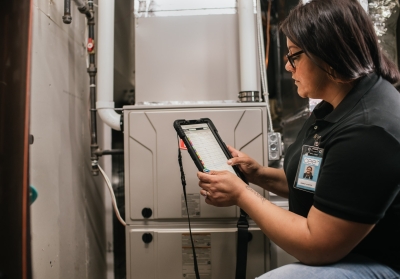Overview
Homeowners and contractors in cold climates have to consider many factors (economics, environment impacts, comfort, and fuel security) when switching primary space heating systems from furnaces to ASHPs. They must balance economic decisions such as high upfront costs and potentially higher utility bills with environmental and fuel security priorities, like a desire for back-up heating fuel or to no longer rely on fossil fuels for their heating load. A homeowner’s view of a home retrofit project’s success may depend on how well their auditors and contractors can navigate the homeowner’s project goals and desires, which can conflict.
The project team will apply their experience across three midwestern research and implementation organizations, in conjunction with manufacturer partners, to test solutions and tools for participants in a City of Minneapolis residential decarbonization program. Through community stakeholder and city staff engagement, we will identify target buildings and neighborhoods with a focus on Justice 40 communities. We will develop decision-making tools, methods, and training for practitioners to incorporate building envelope improvements with air source heat pump (ASHP) selection and installation. Evaluation of load estimation methods and duct system performance diagnostics will improve system performance. Continuous ASHP monitoring will provide more accurate modeling for system selection. Our objective is to expand this work to address the scaling challenges of decarbonizing existing residential housing. We will start by demonstrating in Minnesota with consideration for additional projects in Illinois and Wisconsin.
In addition to our listed project partners and client, the project team will be working with industry partners including Aeroseal LLC, Carrier Corporation, Commonwealth Edison, Daikin Comfort Technologies North America, Inc., LG Electronics, and Mitsubishi Electric.
Project Summary
Objective
-
Use existing data sets comprising Minneapolis residential audit data to develop a high-resolution, Minneapolis-specific building stock model with the ResStock toolset.
-
Leverage the model to establish building archetypes and use these to develop and optimize decarbonization approaches, with a focus on strategies that support energy justice for renters, low-income households, and marginalized communities.
Scope
-
Engage several groups involved in building decarbonization, including auditors and contractors, rental property owner groups, community-based organizations, customers, and decarbonization programs funded by the City of Minneapolis.
-
Continuously monitor ASHP performance in a sample of Twin Cities residences to better understand heat pump sizing and building envelope improvement trade-offs.
-
Conduct duct system performance measurements for a segmented sample of 50 Twin Cities residences.
Non-energy benefits
-
Greater input from and emphasis placed on the comfort, cost, and maintenance needs and desires of residents living in under-invested communities.
-
Development of more realistic residential retrofit strategies that balance sustainability and cost concerns.
-
Expanded contractor support for optimized sizing and installation of ASHPs.

